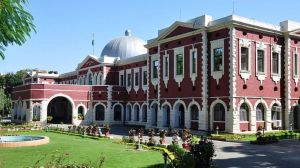UTI-1 has a quiet junkyard sale
Careful not to disclose its lineage, a recent advertisment signals the last rites of the problem half of the Unit Trust of India, UTI-1. The...

Careful not to disclose its lineage, a recent advertisment signals the last rites of the problem half of the Unit Trust of India, UTI-1.
The ad invites expressions of interest for purchase of sizeable equity holdings in 50 companies. Listing companies and the number of shares on the block, the ad states, ‘‘Our client seeks evaluation of various exit options on the following portfolio…’’
Most of the companies are quaint – The Thana Electric Supply Co., Datasoft Application Software, Bhilai Engineering, Gujarat Telephone Cables, Gayatri Starch Kem, et al. The number of shares on offer is huge in some cases – 1.16 crore shares in Modern Syntex, 94 lakh shares in Apollo Fibres, 92.7 lakh shares in Oswal Agro Mills, for instance.
A comparison by The Indian Express of the stocks in the ad with the last-known portfolios of UTI-1 schemes reveals that not only are there enough matching names, there were 20 companies in which even the number of shares were the same.
When contacted, UTI-1 Chairman S B Mathur confirmed that the shares on the block are indeed theirs. ‘‘There’s nothing secretive about it. We have acquired a number of stocks over the years, some of which are now delisted, suspended from trading or unlisted. It’s very difficult to discover the prices for these internally.’’
UTI-1 has appointed merchant bankers to discover the price and find buyers for about 200 stocks in which it has large holdings. ‘‘People may say these are dud stocks, but we would rather let professionals decide that,’’ says Mathur.
An official in one of the three merchant banking firms who have got the mandate to dispose off the shares, says, ‘‘Our client wants to sell these shares as of yesterday.’’ Whenever that happens, it would mark an end to an era for the UTI, part of which imploded four years ago after Ketan Parekh drove Indian stock markets into a hallucinogenic boom and bust. These problem schemes, where returns had been assured, were the isolated into a separate entity – the Special Undertaking of Unit Trust of India (SUUTI), also known as UTI-1.
That said, the market is sceptical whether this sale will yield dividends. ‘‘If an entity has to resort to an anonymous public ad, it’s most likely winding up and has limited options,’’ says a market veteran.
And who would buy these stocks, some of which haven’t been traded for years or are chronic BIFR cases? ‘‘We’ve told the bankers to approach the promoters first, then their competitors or anyone who could have upstream or downstream synergies with the companies’ business,” explains UTI-1’s Mathur.
Mathur is hoping that the merchant bankers will succeed in disposing these problem stocks in the next two-three months, because in March 2006, when the last scheme matures, UTI-1’s administrative set up will be closed.
Already, all listed stocks have been disposed, except for a handful where UTI had buyback arrangements with companies or some legal hassles. Over the last eight months, Mathur’s team has sold shares worth Rs 8,000 crore without the market feeling the impact. ‘‘We sold gradually, but consistently. Of course, we were also helped by the market conditions.’’
What’s left at UTI-1? Well, there’s the strategic holdings in Larsen & Toubro and ITC. The government is yet to make up its mind on these. Then there are some real estate assets that are to be disposed off, including the swanky UTI Towers in Mumbai’s Bandra-Kurla Complex.
But that will have to wait till the fate of UTI Mutual Fund, which is headquartered in the same building, becomes clear.





- 01
- 02
- 03
- 04
- 05


























